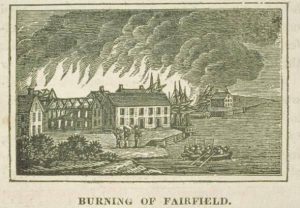“Bartram with his two Daughters Nancy and Flora”
Last month the Connecticut History website shared Alec Lurie’s article “Black Loyalist Refugees: Toney Escapes During the Burning of Fairfield.”
Lurie writes:
A Fairfield County Loyalist who testified to Toney Bartram’s escape was Nathan Hubbell, captain of an “armed boat company.” Like Toney Bartram, he settled in Nova Scotia after the war, but he later returned to Connecticut, still “a British Pensioner.”
Lurie writes:
July 7, 1779, presented a perfect opportunity for enslaved people in the town of Fairfield, Connecticut. With more than two thousand British soldiers marching through the streets of an almost undefended Patriot town, several enslaved people were able to make their escape—including a man in his early 20s named Toney. . . .As shown by a document reproduced at the top of the article, the British military authorities ordered that Rogers release the girl. But it’s not clear that happened.
Toney, with his two young daughters in tow, fled slavery on the estate of Job Bartram, a captain in the town’s militia. Though no one recorded the details of their escape, when British troops returned to their ships and sailed across the Long Island Sound to the Loyalist stronghold of Huntington, New York, Toney and his daughters, Flora and Nancy, were on board.
For the next several years, Toney lived in British-controlled New York, probably receiving a meager wage for the work he provided to the British troops. Whether he was cooking, chopping wood, or carting supplies, the arrangement was undoubtedly an improvement from his life in Fairfield.
The danger, however, was not over; in spring 1783, Toney made a bold demand. In a formal petition, he pressed the British military to protect his family. At some point during his stay in New York, Nancy, Toney’s young daughter, was kidnapped. . . . According to British military records, Henry Rogers detained Nancy with the intention of selling her back to her former enslaver.
A Fairfield County Loyalist who testified to Toney Bartram’s escape was Nathan Hubbell, captain of an “armed boat company.” Like Toney Bartram, he settled in Nova Scotia after the war, but he later returned to Connecticut, still “a British Pensioner.”

